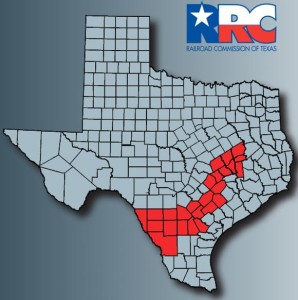Data shows Carrizo Wilcox Aquifer contains enough water to support oil and gas development
The Eagle Ford Task Force (EFTF), appointed by Texas Railroad Commissioner David Porter, convened in San Antonio in November and December to discuss water quantity and usage as it relates to oil and gas production in the Eagle Ford Shale.
The 26-member group was presented with data and statistics concerning water usage from several sources, and subsequently met privately to discuss the data presented and consider its implications.
The task force came to the conclusion that, based on the information presented, the Carrizo Wilcox Aquifer in South Texas appears to contain enough water resources to support oil and gas drilling activities, including hydraulic fracturing, in the Eagle Ford Shale while meeting all other projected uses.
“I am pleased to announce, after exhaustive research, our task force has found water sourcing in South Texas is currently not an issue,” said Railroad Commissioner David Porter. “We will continue to study best practices for water management in the region to help mitigate any future issues.”
South Texas Water is Sufficient for Fracking
The data presented to the group indicated that drilling and completions in the Eagle Ford Shale account for approximately six percent of the water demand in South Texas, while irrigation accounts for 64 percent and municipal uses account for 17 percent.
In addition, the industry as a whole has reduced the amount of water it uses to hydraulically fracture wells. Currently, industry is reporting an average use of approximately 11 acre-feet of water used to complete each well, down from the approximately 15 acre-feet previously used.
Industry experts informed the task force that approximately 2,600 to 2,800 new wells are expected to be completed annually in the Eagle Ford Shale at peak demand, which translates into about 30,000 acre-feet of water per year during the heaviest point of development of the Eagle Ford Shale. In 2008, the Carrizo Wilcox Aquifer contained 540,000 acre-feet of available water.
"I am pleased industry has made improvements in reducing the amount of water used in the hydraulic fracturing process, and we look forward to working in a cooperative manner with all task force stakeholders to continue improving the process,” said task force member Teresa Carrillo, Sierra Club, Executive Committee Member, Lone Star Chapter. “However, there is still concern that this pumping may have localized impacts on water levels in the aquifer and on aquifer discharges to streams and springs. We are hopeful that through this task force process our concerns will be addressed. Texas is on a world stage and we can make this a model for all the nation and the rest of the world to follow.”
Future Water Sources and Monitoring
Several task force members also indicated their companies are looking into using brackish water for hydraulic fracturing versus fresh water, freeing up even more resources in the Carrizo Wilcox Aquifer.
“EOG is always looking for ways to conserve natural resources and we are taking significant steps to minimize water usage,” said task force member Steve Ellis, Senior Division Counsel, EOG Resources, Inc. “In addition, we are expanding the use of brackish water in our completion operations to reduce the demand for fresh water.”
Presently, there are several mechanisms in place to monitor water usage in the region. For example, local Groundwater Conservation Districts measure water levels monthly to determine whether levels are increasing or decreasing. Historically, during periods of drought, like the one South Texas has recently been experiencing, water levels will decline until normal rain patterns return. At which time, water levels tend to return to pre-drought levels.
“We have seen water levels drop this past year due to the drought, which has caused everyone to pump more groundwater,” said task force member Mike Mahoney, General Manager, Evergreen Underground Water Conservation District. “However, we do not see groundwater pumping for oil and gas drilling and completions as a significant contribution to the decline in water levels, when compared to overall pumping.”
The EFTF will continue to meet monthly to examine issues pertinent to the region.
David J. Porter was elected to the Texas Railroad Commission on November 2, 2010. A Certified Public Accountant and successful small business owner, Commissioner Porter has worked with oil and gas producers for nearly three decades providing strategic financial advice and tax counsel. He has a long record of pro-business, free market, conservative credentials. Visit www.rrc.state.tx.us for additional RRC information.
Contact Lauren Willis at [email protected] for additional information.

